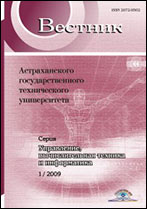|
This article is cited in 2 scientific papers (total in 2 papers)
COMPUTER SOFTWARE AND COMPUTING EQUIPMENT
Using machine learning methods in power equipment repair programs
V. A. Borodina, O. M. Protalinskiyb, V. F. Shursheva
a Astrakhan State Technical University,
Astrakhan, Russian Federation
b National Research University “Moscow Power Engineering Institute”,
Moscow, Russian Federation
Abstract:
The article discusses the process of planning the repair of energy equipment. Using a decision support system is proposed because of the large number of rules of comparing flow charts of technical defects. Such a system can speed up the planning process and reduce economic costs. A conceptual model of the system has been built; further it will be presented as a multi-label classification of cross-cutting classes. The “one-vs-all” approach has been used: each flow chart can use its individual classifier. Metrics are proposed for evaluating classifiers: a portion of accurately classified objects, precision, fullness and $F$-measure. To summarize the evaluation results the concept of micro-average was chosen. A defect classification algorithm has been described. An experiment was conducted using different classification algorithms: decision trees, Bayes classifier and multilayer perceptron. The results of the experiment proved that $80$–$90\%$ of the correctly classified objects were found (high values), but the average values of accuracy and fullness occurred low ($3$–$7\%$). There were found sets of data, where different output data corresponded to similar input data. Thus, machine learning can be used to support decision-making, but in some cases information about the order is not complete. Defect classification can be combined with manual clarifying of results or with different algorithms.
Keywords:
decision support system, asset management system, flow charts, defects, equipment, repair program, classifier.
Received: 31.05.2019
Citation:
V. A. Borodin, O. M. Protalinskiy, V. F. Shurshev, “Using machine learning methods in power equipment repair programs”, Vestn. Astrakhan State Technical Univ. Ser. Management, Computer Sciences and Informatics, 2019, no. 3, 25–33
Linking options:
https://www.mathnet.ru/eng/vagtu585 https://www.mathnet.ru/eng/vagtu/y2019/i3/p25
|

|




 Contact us:
Contact us: Terms of Use
Terms of Use
 Registration to the website
Registration to the website Logotypes
Logotypes








 Citation in format
Citation in format 
